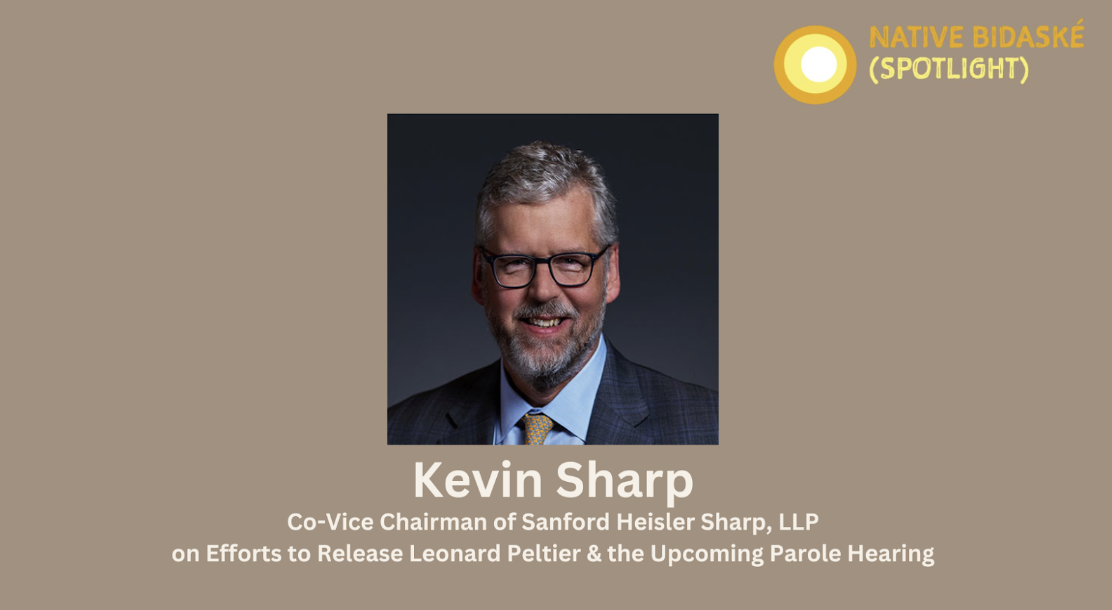
- Details
- By Native News Online Staff
Don't miss out as Levi Rickert, Founder and Publisher of Native News Online, interviews former federal judge Kevin Sharp about Leonard Peltier's upcoming parole hearing on Monday, June 10.
Sharp, an advocate for Peltier's release, will discuss Peltier's poor health at the age of 79 after decades of incarceration. He believes that Peltier will be at risk of death if kept in a maximum security prison. We will also learn about the historical context of the 1975 Pine Ridge murders and the turbulent period when Peltier was involved with the American Indian Movement. Sharp believes that Peltier's constitutional rights were violated in his trial and investigation. The parole hearing will consider testimony from Peltier's supporters and the government. Advocates hope that Peltier's release will help remedy past wrongs and allow for healing.
Sharp is Co-Vice Chairman of Sanford Heisler Sharp and Co-Chair of the Public Interest Litigation Group. He served as a U.S. District Judge for the Middle District of Tennessee from 2011 to 2017, including as Chief Judge from 2014 to 2017, handling over 4,000 cases and several high-profile ones like Young v. Giles County Board of Education and Rodriguez v. Providence Community Corrections, Inc. With nearly 30 years of experience, Sharp has litigated complex civil cases, including opioid litigation and significant employment and fiduciary breach settlements. He has received numerous accolades, including The American Lawyer’s South Trailblazers and Lawdragon 500.
Since 2019, he has led a nationwide push to secure presidential clemency for Leonard Peltier, a 77-year-old Native American civil rights activist wrongly convicted in federal court and sentenced to two consecutive life terms for killing FBI agents at Pine Ridge Reservation in 1975. The U.S. Attorney’s office has since admitted it doesn’t know who killed the agents.
Tune in to Native Bidaské LIVE this Friday, May 24th at 12 Noon ET on Native News Online's Facebook, X (Twitter), or YouTube channel.
More Stories Like This
Native News Weekly (August 25, 2024): D.C. BriefsScope Narrowed, Report Withheld: Questions Mount Over Michigan Boarding School Study
Zuni Youth Enrichment Project Announces Family Engagement Night and Spring Break Youth Programming
Next on Native Bidaské: Leonard Peltier Reflects on His First Year After Prison
Deb Haaland Rolls Out Affordability Agenda in Albuquerque
Help us defend tribal sovereignty.
At Native News Online, our mission is rooted in telling the stories that strengthen sovereignty and uplift Indigenous voices — not just at year’s end, but every single day.
Because of your generosity last year, we were able to keep our reporters on the ground in tribal communities, at national gatherings and in the halls of Congress — covering the issues that matter most to Indian Country: sovereignty, culture, education, health and economic opportunity.
That support sustained us through a tough year in 2025. Now, as we look to the year ahead, we need your help right now to ensure warrior journalism remains strong — reporting that defends tribal sovereignty, amplifies Native truth, and holds power accountable.
 The stakes couldn't be higher. Your support keeps Native voices heard, Native stories told and Native sovereignty defended.
The stakes couldn't be higher. Your support keeps Native voices heard, Native stories told and Native sovereignty defended.
Stand with Warrior Journalism today.
Levi Rickert (Potawatomi), Editor & Publisher


